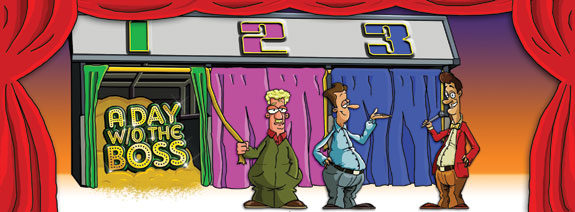A popular cable show, “Chopped,” routinely appears on the Food Network. In this show four chefs of varying experience, training and positions vie for the title of Chopped Champion and a prize of $10,000. Each round begins when the emcee tells the contestants “Open your baskets!” The contestants must prepare a specific dish incorporating the mandatory ingredients. There are three dishes – appetizer, main entree and dessert. The preparation is timed from opening the baskets to a finished plate. There are no cooking assistants or sous chefs. There are no recipe books. They are on their own.
After each round the dishes are presented to a three-member panel of culinary experts who are the judges. After tasting the dishes and questioning the contestants, the judges select one contestant to be chopped. The last chef remaining after the dessert round is the Chopped Champion.
The challenges are many – time, dealing with pressure, depth of knowledge of a wide range of foods and spices and quick thinking. Rather than the luxury of hours or even days to contemplate a dish with specific ingredients, the contestants have seconds from seeing the ingredients to plan, prepare and plate the dish.
Because of the unusual mix of ingredients, or even bizarre ones for a particular dish (yucca, pretzels and horseradish for dessert, anyone?), the possibility any of these contestants had ever prepared such a dish with those particular ingredients is most unlikely.
They have to decide how they are going to use those ingredients and what other ingredients they need, and they have to make that decision immediately. And once decided, they have to prepare the dish in the limited time.
Even then, false starts, burnt cakes, falls, cut fingers, an occasional stove-top fire and other mishaps require major mid-course adjustments and more quick thinking.
Because of the unique ingredients and the time limits, even the most talented chef can fail in this think-fast-on-your-feet show.
The phrase that can describe the position of the contestants is the Latin phrase ad hoc. Its simple translation means “for that.” It is the opposite of “systematic” or “planned.” After all, they are exposed to a unique combination of ingredients with a specific challenge to be done immediately. There is no time for planning.
Imagine if every morning you stood on the silage pad with your nutritionist and herdsmen and opened the bays and bunkers to find new ingredients for your dairy’s TMR. Ad hoc TMRs do not describe the dairy diets of today.
As spontaneous as the show appears, there really is a lot more planning and thinking behind each of the meals. In the first case, just the knowledge and experience each contestant has acquired over the years can help them identify the properties and potentials of the ingredients.
But more than that, the contestants, particularly the better ones, have worked out ahead of time various scenarios. For example, the outline or several outlines of a main course dish – a protein, a starch and a vegetable – and then substitute and adjust with other ingredients in the mystery basket and pantry.
Dairy producers and business people constantly open mystery baskets with mandatory ingredients. Then they are required to make the best use of those ingredients. Sometimes it is for the next 15 minutes, a day or maybe even the rest of their life.
While dairymen can take pride in their ability to face whatever is thrown at them and persevere, there will come a time when the greatest mystery basket will be opened that will forever change their enterprise.
You will not open the basket; your family and business partners will. This mystery basket will have one ingredient – the business. Missing permanently, from the basket and the pantry and unavailable, are you and your wisdom. They are now on their own.
Time begins to tick quickly. In the midst of profound grief and loss, the inability to focus on anything but the short term and then only at the surface level, these loved ones will be required to make some of the most profound business decisions of their life – and do so without you.
The mystery to the basket is not that someday you will not be an ingredient to the enterprise; the mystery is when and under what circumstances. Those are the surprises facing your family and surviving partners. Unprepared, the choices they make ad hoc can risk all that you and they have built.
It is this uncertainty of time and circumstance that makes succession planning so difficult. What will the secret ingredients be when the survivors open the basket?
Add the risk to that uncertainty. Tight margins and high capital requirements leave little room for error. Forced decisions under distress, stress and personal distraction absent the leader only increase the chances of error.
Lawyers, estate planners, insurance salesmen, accountants, bankers and other professionals call for dairy producers to have estate plans. Those are primarily plans to mitigate the impact of tax law and to provide an orderly transfer of assets.
There is a place for that, but that is not all of succession planning. Succession planning provides a means by which the day-to-day work and longer-term implementation of the modern dairy farm enterprise’s plans will continue profitably and efficiently even when one of its key assets, you, is no longer around.
Estate planning speaks of assets; succession planning speaks of using those assets. More importantly, having in place the wisdom to use the assets at the maximum.
The single-best approach for succession planning does not require confabs with professionals and survivors, but a continuous and running dialogue about all aspects of the business with all of the major players. These include family members, partners, key employees and the members of your professional team.
As the business day unfolds, tell these others what you are thinking about the business and why. Imagine you have learned that the great mystery basket will be opened on a specific date.
You have until then to prepare the contestants – the survivors. Operate the business daily with the idea that you are training and preparing them for a successful succession.
Part of this instruction is letting them not only know who are the suppliers and buyers of the business, but to know them. This means others should know and be known by the person who sells you feed or markets your milk.
Besides ongoing training, actually take time to outline how things should operate upon your death. Identify in writing those individuals who you think can take over the various roles which you perform today. There likely will be more than one. Let others know what you think.
Build a team of advisers for the successors. This includes the attorneys, accountants, brokers, bankers and nutritionists and others. Create familiarity and develop trust between the successors and this team so that the successors can quickly and confidently avail themselves of that much-needed advice and guidance during a difficult time.
Be realistic about who can do what when you are gone. Do not let your desire that a certain child replace you overcome the reality that they are dealing with issues making them unfit. It may be from substance abuse, mental/physical limitations or a lifetime of refusing to learn.
Despite the dramatic change in their life, most probably they will be the same before and after the funeral.
Allow the successors the greatest flexibility to make decisions addressing the issues they face. Avoid “hands from the grave” provisions in deeds, trusts and wills that would limit the survivors’ choices. Note that they are only hands; there is no brain behind them, and they become shackles.
The eyes, brains and hands of the survivors will better respond to current issues than those whose viewpoint was from a time years before.
One of these seemingly appropriate limitations that can sink an enterprise is the natural desire to have the enterprise not only continue but to continue in the way it was run up to that point and at the same location.
Ever-changing economic conditions and markets mean that business models and locations also need to change. Denying the survivors the ability to make those adjustments can guarantee defeat.
As hard as it may seem, recognize that continuation of the business in the family may not be possible. The children may be too young or unwilling to take on the enterprise. Then the succession planning is a controlled conversion of the farm assets into assets that can help the family.
Now, back to that confab mentioned above. Periodically meet where the succession plan is laid out and discussed. Occasionally, actually walk through the first hours, days and months of your absence.
What questions are there? What pitfalls come up? Have your successors try it without you and then come back with questions. All of these are ways to train and be prepared.
In these exercises, consider scenarios different from that day. For example, if this had happened in 2009, what would they have had to face? Or consider that the death came as a result of a fire that also destroyed most of the animals and the barns.
All of this probing will reveal vulnerabilities – vulnerabilities that can be corrected now, making not only succession easier, but operating the business today better.
We do not know when our time ends. But if we do not want our death to mean the death of the family enterprise, then we need to realize that the moment could be now and the better prepared, the better for our family and our business.
So the emcee tells your family, “Open your basket!” The mandatory ingredient is a life without you. The time begins now. Will they respond ad hoc, or be prepared? Now you can answer that question. PD

Ben Yale
Yale Law Office
ben@yalelawoffice.com







